Hacker Communities, Local Communities
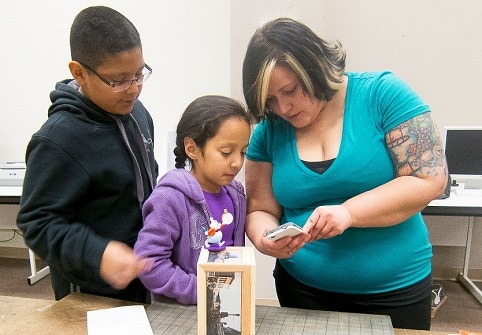
Mariano Ulibarri, director of the hacker space Parachute Factory in New Mexico, heard about Hacker Scouts in the news just a few months ago. His immediate reaction was to start a troop locally – so he did. Two months after NPR featured Hacker Scouts, Mariano hosted his first Hacker Scouts meeting. “We didn’t really do a whole lot of planning. I used to teach 5th and 6th grade here, so I know some kids in the community that I thought would be interested.” He originally thought a group of about 20 kids might sign up. 20 did – then 30, and the group is now pushing 40. But the amazing thing about Hacker Scouts Guild #005 is not how quickly they got up and running – it’s the unique group of people involved.
A Local Connection
Guild #005 is based in Las Vegas, New Mexico, population 13,656. “We’re in one of the poorest areas of the country here. It’s a very rural community about an hour north of Santa Fe,” explained Mariano. “The group of us [that started Parachute Factory], we’re all locals.” Mariano and Parachute Factory’s other founders were born and raised in Las Vegas, but left in their teens and 20’s to see the wider world. “[We] lived all over the place and came back because realized we love this place.” They don’t just offer equipment and expertise to Guild #005 – they offer hacking and making with real ties to the community.
“One of the things we think is really important,” says Mariano, “is we try to tie in local culture. This community is really old – Sante Fe is 400 years old. A lot of people don’t realize this area of the country has been around for a long time. In addition to the high tech stuff we like to bring in the traditional things.” They’ve made sopaipillas, hosted demonstrations by local woodworkers, and created an event called “DIA de DIY” (as in “Day of Do-It-Yourself”). “The kids screen printed prayer flags of local saints and sewed them up with conductive thread and UV LEDs. The kids’ work was on display at a Dia de los Muertos exhibit here in town. It was a fun project that mixed low-tech with high-tech and connected the kids to local traditions,” explains Mariano.
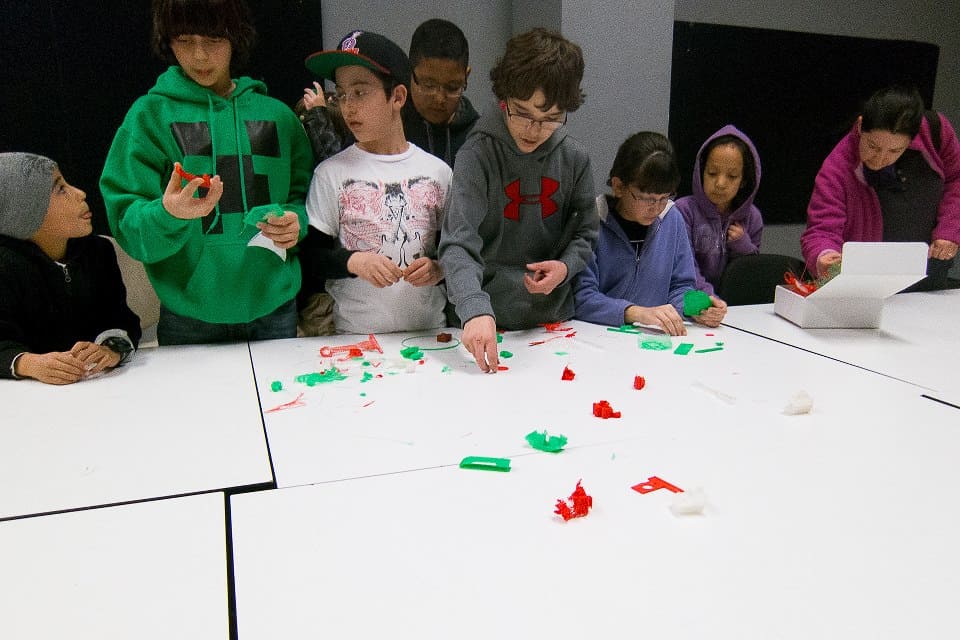
Tailored to Fit
When they joined the national Hacker Scouts (based in Oakland, California), they knew they wanted to incorporate the Hacker Scouts’ core values and use the badge tree, but with tailoring to fit their community. “From the very beginning we thought that we would modify and add our own badges in and maybe not do [others]. For the most part we’re pretty well in line with what’s coming out of Oakland but we’re operating with the understanding that we’re going to tailor it to our community and add in some things that are pretty specific to this area.” Mariano credits the success of their maker space and Guild to this community tailoring. “We’re trying to really pay attention to the community and what people really want to do and what’s needed.”
“A lot of people even from my generation, 30-year-olds,” adds Mariano, “a lot of us grew up without electricity or running water. We’re kind of a rugged place and it’s still very much the Wild West.” The region’s agriculture and ranching inspires a focus on heritage technology, which Mariano describes as “bringing back old ways of doing things but [incorporating] new ways of doing things.” They’re partnering with the local community garden to help add solar powered lighting and with the local cowboy history museum to help develop exhibits. “We put a lot of value in the traditional way of doing things in this rural community and we want kids to be exposed to those things. We want to show them that there’s value in traditional ways of doing things and at the same time have the kids introduce new technologies and new ways of doing things to the older generation that may be … not so fluent in the high tech way that the world is going.”
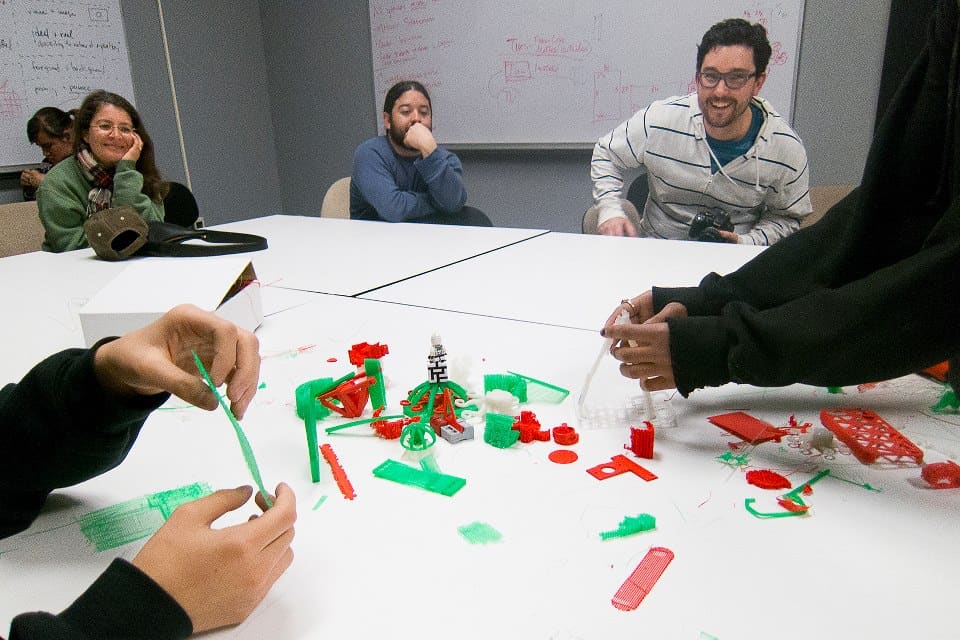
Making the Most of Partnerships
Part of this regional tailoring includes operating on a shoestring budget. “The maker space stuff we’ve been doing has been really low budget,” explains Mariano. Parachute Factory is partnered with the Media Arts and Technology Department at New Mexico Highlands University; their funding is tied to the Department of Cultural Affairs, which also manages the state’s museums, so they make good use of partnerships. For the Guild’s second project, they partnered with the Santa Fe children’s museum to prototype an interactive exhibit. “Over the summer we have plans to connect with the natural history museum in Albuquerque and have the kids work with a maker space that’s popping up there in the museum.” Mariano also works his ties in the museum world to bring in mentors for the Guild. “We had Elizabeth Neely from the Art Institute of Chicago visit us. She’s been working on 3D scanning a lot of the sculptures at the Art Institute and publishing them on Thingiverse. … One of our worries was [we’d end up with] a group of 10-year-old boys who play Minecraft and like doing geek stuff. We wanted as close to an equal ratio of boys to girls as we could get. I wanted to bring [Neely] here as a role model for the girls, to show them that girls can do super geeky things and have fun with it. … Mentor-wise we have a good group of us here [at Parachute Factory] but we’re also looking outside, trying to bring people in who are high profile and the kids can look up to.”
“It has to serve the community.”
Another project of Guild #005 is monthly pop-up maker space events. “Our first one was over the weekend and we just let the Scouts run it. They were teaching people about circuits.” Mariano adds, “We love the idea of Hacker Scouts as a learning option for these kids. I taught in the public schools and got really burnt out and frustrated because I felt I couldn’t teach in ways that were meaningful – it was teaching for the test [even though] I was in a really progressive charter school. I’ve seen kids learning more than I’ve ever seen kids learning, they’re really taking off with it.”
Whatever program you offer, Mariano says, “it has to serve the community, to equip them to deal with the outside world. Like I said, it’s a poor community and the only way we can survive is if we’re active participants and bringing something that’s needed.”
Photos courtesy of Guild #005 and Hacker Scout Mariana.


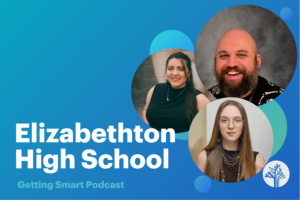


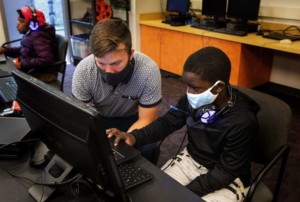
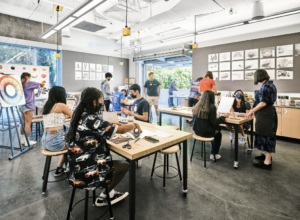
0 Comments
Leave a Comment
Your email address will not be published. All fields are required.